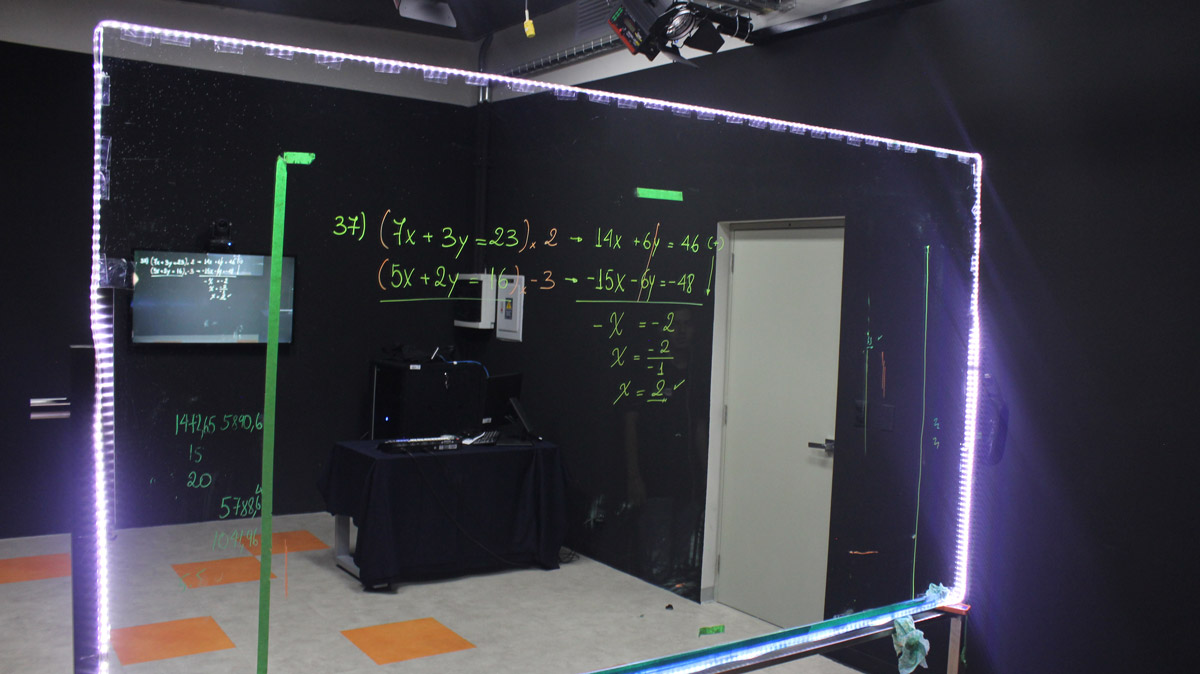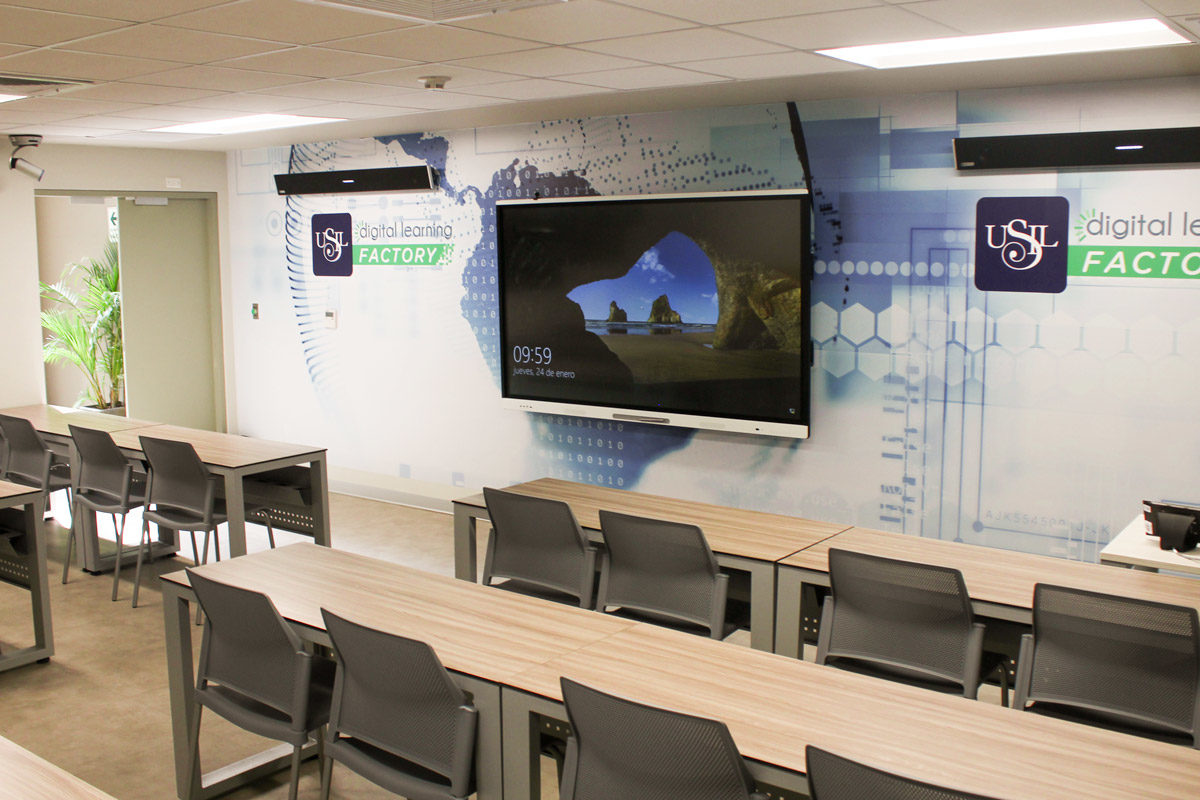Case Study: USIL Digital Learning Factory at Universidad San Ignaciode Loyola
Download the Case Study PDFAtlona signal distribution and IP-based AV control provide ease and reliability at new distance learning facility
Distance learning offerings have long enabled academic institutions to extend their reach beyond their physical campuses while making higher education more accessible to students in remote locations. Striving to take virtualized learning in Peru to the next level, the recently-opened USIL Digital Learning Factory at Universidad San Ignacio de Loyola features advanced laboratories for the production of educational content for digital delivery.
Inaugurated just days after the university celebrated its 50-year anniversary, the USIL Digital Learning Factory is a key component of the San Ignacio de Loyola Educational Corporation’s ongoing digital transformation initiative. The purpose-built facility houses eleven dedicated rooms for recording virtual classes, all controlled and interconnected by state-of-the-art AV technologies.
Seamless Signal Distribution
Spanish global technology solutions distributor Crambo provided the AV system design for the USIL Digital Learning Facility, with installation performed by Crambo partner and Peruvian systems integrator Rio Pacifico. Ten of the eleven content laboratories are used exclusively as sets for distance learning production, with no student seating whatsoever. Course materials are presented using a combination of laptops, desktop computers and 65-inch interactive whiteboards, with AVer CAM530 cameras capturing video of the instructor. For the majority of these spaces, Crambo chose Atlona AT-HDR-H2H-44MA 4×4 HDMI-to-HDMI matrix switchers to route the various sources to multiple in-room displays and the facility’s centralized control room.
“Atlona matrix switchers are our ‘go-to’ reference equipment,” said Miguel Ángel González Suárez, production engineer at Crambo. “The ratio between their price, performance and quality is extremely good. With three HDMI sources and four destinations in most of the rooms, the 4×4 HDR-H2H-44MA was the right fit.”
The larger eleventh room doubles as a 30-seat auditorium when students come in to meet their teachers at least once per year, and sports an 86-inch digital whiteboard and video conferencing system. An Atlona AT-UHD-PRO3-88M 8×8 HDMI-to-HDBaseT matrix switcher serves the increased signal routing requirements of this bigger space.
Crambo deployed Atlona AT-UHD-EX-70C and AT-UHD-EX-100CE extenders to transport HDMI, power and control signals over HDBaseT from each production lab to the central control area, with the latter models chosen to address the longer distance requirements of the furthest-away rooms. “Once again, we chose the Atlona products because the quality-to-price ratio is very good, and the extenders have proven reliability,” said Suárez. “ Another important benefit was that Atlona’s PoE support allows us to power the receivers from the transmitters. With 11 receivers in the control room, that saves us from needing 11 additional mains plugs, since they obtain power via the CAT6 cables instead.”
In addition to distribution within and between rooms, video and audio signals are recorded to a Sonic Foundry Mediasite recording appliance in each lab. Recordings of classes are managed through the Mediasite platform and stored in the Amazon Web Services cloud, where students can access them through the USIL Virtual Campus.
While the AV distribution architecture at the USIL Digital Learning Facility was designed for future-friendly 4K production capabilities, Crambo and the university chose not to go beyond full 1080p60 HD yet based on the program’s goals. “While the Atlona solutions support Ultra HD, we decided to stay in HD,” explained Suárez. “As the content is intended to be published on the internet, 4K would currently present some encoding and remote delivery challenges. Full HD is fine for the nature of this usage.”
Simplifying Control
A key objective of the USIL Digital Learning Facility project was to make the AV system extremely easy to use for instructors. “We didn’t want the teachers to have the hassle of learning a new environment or of having to use multiple different interfaces to do what they needed,” said Suárez.
Crambo selected Atlona’s Velocity IP-based AV control and management platform to provide the ease of use, scalability and flexibility USIL needed. A single Velocity Gateway control processor handles roughly 100 devices across the facility, including Atlona solutions and third-party products as well as relays for powering additional equipment on and off. A second Velocity Gateway was deployed as a backup for automated, fault-tolerant redundancy. Each production room has its own Velocity Touch Panel, with 5.5” touchscreens in the ten smaller rooms and an 8” model in the flagship space.
“We configured the laboratories to make them simple, so that users can control the complete recording setup with only the use of the one touch screen,” Suárez explained. “We created eight Velocity macros that fit in a single screen, each of which executes all of the commands needed for whatever the user is trying to do.”
Specifically, users can change the perspective of the camera; start, pause and stop recordings; switch between their laptop and the desktop computer; or mute and unmute the microphone. “They have all of this control in a single page, with graphical icons that make it very intuitive,” he added. “When it came time to train the instructors on using the rooms, it was so easy that it basically took just one minute. That was hugely well-received by the users.”
Crambo found Velocity’s ease of use similarly exceptional from a systems integration perspective. “The ease of integration Velocity offers is amazing,” said Suárez. “ I’m not a programmer, but combined with the extraordinary support from Atlona’s customer service team, I could do it myself.”
Suárez also took advantage of Velocity’s ability to replicate configurations across multiple rooms. “Eight of the rooms were exact mirrors of each other,” he said. “After we did the first one, we replicated it and just made minor updates such as the IP addresses of the equipment. This feature was a huge time-saver.”
As an IP-based system, Crambo was able to deploy Velocity on the university’s standard network infrastructure. “We just had to ask for the number of LAN ports we needed, and they were accommodated with the facility was built. Their IT department didn’t need to provide any special configurations for Velocity, and they were very happy not to have to comply with any unusual specifications.”

“We chose Atlona products because the quality-to-price ratio is very good, and the extenders have proven reliability.”
– Miguel Ángel González Suárez, Production Engineer at Crambo
A Flexible Future
Building on the success of the USIL Digital Learning Facility project, Crambo will install a similar recording room at the institution’s smaller San Ignacio University campus in Miami, Florida. Locations in Paraguay and Bolivia are also on the roadmap.
Even within the initial installation, Suárez highlights the scalability that the Velocity control system offers for further expansion. “If the university wants to change the configuration, they can do that easily through Velocity, and they have a lot room to grow if they want to add new devices,” he noted. “We have approximately 100 devices on the one gateway today, but it can handle up to 250, leaving them lots of ability to scale.”
Beyond that scalability, Velocity’s ease of integration, intuitive simplicity and flexibility have left a lasting impression on both Crambo and their customer. “ For me, Velocity represents a major change in control systems,” added Suárez. “ I’m blown away by it, and it’s something that I believe all institutions and enterprises should explore.”
“The ease of integration Velocity offers is amazing. I’m not a programmer but combined with the extraordinary support from Atlona’s customer service team, I could do it myself.”
– Suárez
| PRODUCTS FEATURED | PRODUCTS FEATURED |
| Model | Description |
| AT-HDR-H2H-44MA | The Atlona AT-HDR-H2H-44MA is a 4×4 HDMI matrix switcher for high dynamic range (HDR) formats. Part of the comprehensive family of Atlona 4K HDR integration products, it is HDCP 2.2 compliant and supports 4K/UHD video @ 60 Hz with 4:4:4 chroma sampling, as well as HDMI data rates up to 18 Gbps. |
| AT-UHD-EX-70C-KIT | The Atlona AT-UHD-EX-70C-KIT is a 4K/UHD HDMI over HDBaseT transmitter/receiver for HDMI transmission up to 230 feet (70 meters) over category cable with RS-232 and IR control plus Power over Ethernet capability. |
| AT-EX-100CE-KIT | The Atlona AT-UHD-EX-100CE-KIT is an HDBaseT transmitter/receiver kit for HDMI transmission up to 330 feet (100 meters) over category cable with Ethernet pass through, RS-232 and IR control, plus Power over Ethernet. |
| AT-UHD-PRO3-88M | The Atlona AT-UHD-PRO3-88M is a dual-distance 4K/UHD 8×8 HDMI to HDBaseT matrix switcher 4K/UHD @ 60 Hz video signals with Power over Ethernet for receivers and analog audio breakout. |
| AT-VGW-250 | The Atlona AT-VGW-250 Velocity Control Gateway is an AV control processor for the Atlona Velocity Control System. The VGW-250 is capable of serving up to 250 simultaneous IP device connections for Atlona and third-party AV devices, Velocity touch panels, and BYOD control from web browsers and mobile devices. |
| AT-VTP-550 | The Atlona VTP-550 is a 5.5" touch panel for the Atlona Velocity Control System. It features contemporary, refined styling for modern presentation environments with 720×1280 native resolution, and a capacitive glass surface that supports multi-touch and gesture interactions. |
| AT-VTP-800 | The Atlona VTP-800 is an 8" touch panel for the Atlona Velocity Control System. It features contemporary, refined styling for modern presentation environments with 1280×800 native resolution, and a capacitive glass surface that supports multi-touch and gesture interactions. |








